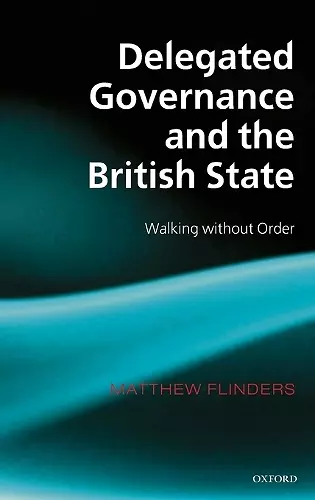Delegated Governance and the British State
Walking without Order
Format:Hardback
Publisher:Oxford University Press
Published:21st Aug '08
Currently unavailable, and unfortunately no date known when it will be back

Winner: W. J. M. Mackenzie Book Prize
A wide-ranging and provocative new interpretation of the increasingly important role of delegated public bodies in British political life.The delegation of functions and responsibilities to quasi-autonomous bodies operating with a significant degree of autonomy arguably empowers governments to address a wide range of social issues simultaneously without having to be involved with the minutiae of day-to-day socio-political interactions. Delegation therefore provides a structural and esoteric capacity beyond the cognitive and physical limits of politicians. There is nothing wrong with delegation as such. The problem relates to the failure to manage delegation in Britain. And yet we actually know very little about how the state beyond the core actually operates, how many bodies exist, what they do, how they are recruited, or why they were created. These gaps in our knowledge are all the more problematic in light of recent pronouncements by politicians at the national and European levels that 'depoliticisation' is a central strand of their approach to governing. This book seeks to fill these gaps in our knowledge while at the same time cultivating a more balanced or sophisticated approach to the study of delegation. Delegated public bodies as they have been used as a tool of governance in the past should not be confused with how they might be used in the future. This book draws upon research conducted within the very core of the British political system during a Whitehall Fellowship within the Cabinet Office. It argues that the British state is 'walking without order' due to a general acceptance of the logic of delegation without any detailed or principled consideration of the administrative of democratic consequences of this process. In order to underline and develop this argument this books analyses the history of delegated governance in Britain before mapping out the topography of the state beyond the core. Delineating the contours of the state in this way, as well as drawing on theoretical models and insights that have been developed in not only other disciplines but also in relation to other governance frameworks, provides new perspectives on perennial themes and issues. It also raises new questions about the role of the state, the capacity for collective action, the need to reflect on the logic of delegation vis-à-vis specific models or forms...
The frightening evidence of quango power comes in Delegated Governance and the British State... a book that won Professor Flinders an award from the Political Studies Association... and I understand that Liam Byrne and his so-called smarter government team have been pouring over it for months. (As have the Tories apparently). * Sue Cameron, Financial Times *
- Winner of Winner of the 2009 W. J. M. Mackenzie Prize awarded by the Political Studies Association.
ISBN: 9780199271603
Dimensions: 242mm x 163mm x 23mm
Weight: 789g
384 pages